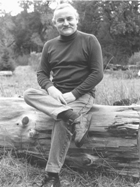The social revolutionary thinker, writer, ecologist, environmental activist and founder of Planet Drum Foundation died on July 28, 2011. Peter Berg was an unforgettable personality for anyone who made his acquaintance over the past several decades.
– from the Planet Drum website
Back in 1990, when I was involved with setting up the Yarra Yarra Bioregional Network, I had a call from someone to see if we would host the famous bioregionalist Peter Berg. Of course, I jumped at the chance.
Peter and his partner, Judy Goldhaft, were travelling Australia, to spread the good word of place based culture, art and politics, and apart from the forums we put on in Melbourne, I spent several days with Judy and Peter, including taking them on a tour of the Upper Yarra valley. It was a most illuminating visit, Peter was like a graceful elder, happy to share his wide ranging experiences, and was constantly both good company and an insightful commentator on local culture.
He and Judy provided wonderful hospitality when I stayed with them a number of times in the mid 90s in their house above the offices of Planet Drum Foundation in San Francisco, but in recent years correspondence had fallen away. Then recently I started to work my way back through some books that had been good friends in my formative years as an activist and I found a chapter in a book by Peter about the days of the Diggers in the late 1960s and his conversion/ evolution that lead him to become a key bioregional thinker and writer in the following decades. It got me thinking about Peter and what he might be up to. In recent times I had tracked some of his work in both Japan and Ecuador. Peter was always ‘keeping the faith’ but also looking for new places to put his shoulder to the wheel.
It came as a huge surprise to hear from my friend Ernie in Spain that Peter had passed away.
We all have our time and no one lasts for ever and Peter had, as they say, a good innings. But it was a real shock and felt like there was a huge gap in the forest of ecological thinking. Peter felt like a big old tree, and suddenly the gap in the canopy showed the reach of his influence.
As we rush headlong into relentless cultural erosion and ecological breakdown, and face the newer challenges of climate change, we are in greater need of sane thinking about how to get out of our various crises than ever before. Corporate-controlled globalisation, the generic nature of consumer lifestyles (and the massive corporate networks that frame and feed these lifestyles) lead us into an ever more perilous century. Place based thinking – thinking that puts people back into place – is possibly as strong as ever, but is almost invisible. In the global North, it manifests through slow food movements, farmers markets, transition towns, permaculture and peak oil groups. But a lot of this energy and movement can feel like they are new forms of consumer lifestyles because they are often stripped bare of politics, or a desire for justice. Witness the constant mantra of many transition towners that I meet – ‘we don’t do politics’ (which is kind of like saying ‘we don’t breathe’).
In the global South, groups like La Via Campesina spearhead the resistance by place based cultures, representing many millions of traditional farmers and growers.
What we need in the North is a new political sensibility, one that understands ecological limits and the need for a cultural transition rather than relying either on simple personal action or political lobbying. Peter and Planet Drum Foundation, which he helped establish, was one of the voices that filled this niche, through their focus on reinhabiting country and building lifestyles and cultures that are resilient, while understanding the forces you will come up against in seeking a true ‘sustainability’. Peter largely worked outside the institutionalisation of environmental NGOs and his deep ecological analysis avoided the sometimes glib, often highly pragmatic choices and politics of this movement. The bioregional movement had the intellectual courage to declare that consumer culture was indeed naked, and needed an entirely new set of clothes. Go well, Peter, you will be sadly missed.
